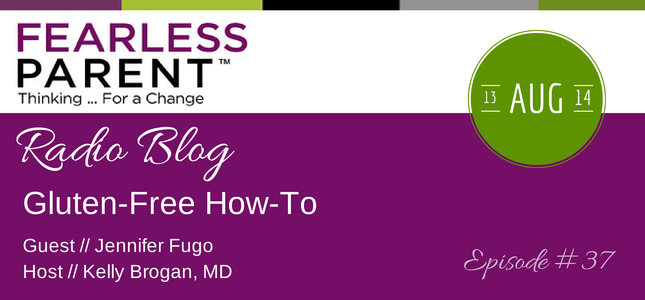NPR reports that 1 in 3 Americans is trying to avoid gluten. We’ve heard that eliminating gluten can reverse autoimmune disease, mitigate our children’s behavioral problems, and even help us lose weight and feel younger.
Gluten-free must be a fad, right?
The truth is, gluten-free can completely backfire. You can end up sicker and heavier, too.
Let’s parse out fact from fiction on the whole gluten-free movement. Once we are thoroughly convinced that there is a role for gluten elimination in health, wellness, and avoidance of conventional medical care, then we need to get down to brass tacks:
- What is gluten?
- Why is it potentially dangerous to our health?
- When and for whom is gluten elimination indicated?
- How does one start a gluten-free diet?
- What are tips and tricks to do this on a budget?
- Are there other hidden concerns with gluten-free choices that can sabotage our health?
 Jennifer Fugo, HHC is the founder of Gluten Free School, an online platform that teaches gluten-sensitive women simple, savvy, and empowering steps to get healthy (a top pick of Dr. Mark Hyman’s). She is a sought-after expert, advocate and speaker on healthy, gluten-free living, and the author of The Savvy Gluten-Free Shopper: How to Eat Healthy without Breaking the Bank.
Jennifer Fugo, HHC is the founder of Gluten Free School, an online platform that teaches gluten-sensitive women simple, savvy, and empowering steps to get healthy (a top pick of Dr. Mark Hyman’s). She is a sought-after expert, advocate and speaker on healthy, gluten-free living, and the author of The Savvy Gluten-Free Shopper: How to Eat Healthy without Breaking the Bank.
 Kelly Brogan, MD is Medical Director of Fearless Parent and mom of two. She is board certified in Psychiatry, Psychosomatic Medicine, and Integrative and Holistic Medicine. Holistic living, environmental medicine, and nutrition are the bedrock of her functional medicine practice. She serves as medical advisor to GreenMedInfo, Pathways to Family Wellness, and Fisher Wallace. Kelly holds degrees from MIT and Cornell Medical School.
Kelly Brogan, MD is Medical Director of Fearless Parent and mom of two. She is board certified in Psychiatry, Psychosomatic Medicine, and Integrative and Holistic Medicine. Holistic living, environmental medicine, and nutrition are the bedrock of her functional medicine practice. She serves as medical advisor to GreenMedInfo, Pathways to Family Wellness, and Fisher Wallace. Kelly holds degrees from MIT and Cornell Medical School.













August 7, 2014 9:11 am
Comments 0